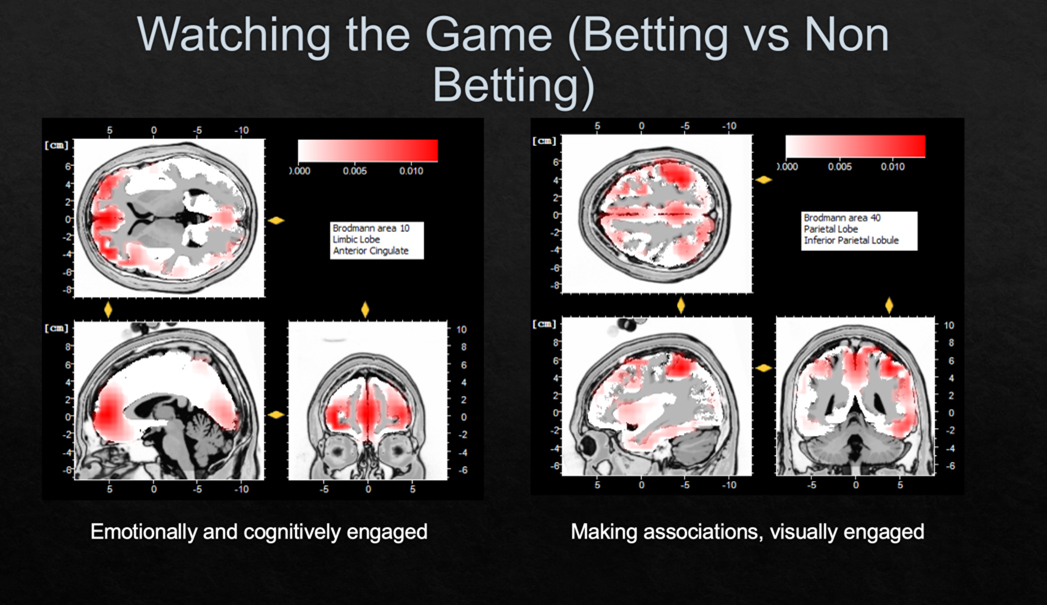A QUT-led project is investigating how smartphones and aggressive marketing are driving growth in sports betting, creating gambling practices that can lead to risk and harm.
The Ashes kicks off tomorrow with the first Test in Brisbane, a treasured event on the calendar of Australian sports fans but one that will also attract a flurry of heavily marketed sports betting opportunities, now the fastest growing segment of the gambling industry and worth $5.5B in 2021.
Researchers says new technologies such as mobile smartphones and sports betting apps make it possible to bet anywhere, anytime, with anyone, and on anything, a trend with many downsides, for gamblers, families, society, and sport. And the COVID-19 pandemic has escalated it further.
Professor Ross Gordon, from QUT's School of Advertising, Marketing and PR, is the lead investigator of the Australian Research Council-funded 'In it to win it - An interdisciplinary investigation of sports betting' project delving into sports betting practices among young Australian low and moderate risk gamblers, and the implications for mitigating gambling related harms.

The project combines qualitative interviews, cognitive neuroscience, and visual ethnographic methods. This innovative approach included monitoring participants using sports betting apps while being monitored with EEG and eye tracking.
"With a busy summer of sport ahead many Aussies may be tempted to have a punt on the cricket, the Australian Open tennis tournament, English Premier League football or anything else that takes their fancy," said Professor Gordon.
"Gambling has always been a big part of Australian culture – but in recent years the total expenditure and per adult expenditure has been increasing steadily. It's more heavily marketed by the industry than ever before, aided by a soft regulatory environment and celebrity endorsements.
"Sports betting is the fastest growing segment of the Australian gambling market, generating $5.5 billion in 2021 and increasing by 4.3 per cent year on year average over the past five years. Furthermore, sports betting is heavily promoted, especially during the television broadcast of sports."
Professor Gordon said young males were often the target of such marketing which links sports betting to mateship, success, social status, adventure, thrills, risk, sex, and power and control, but an increasing number of young women were jumping on board.
"Sports betting as with any form of gambling can come with considerable health, economic and social harms. The cost of gambling related harm is considerable – recent research has estimated that in Victoria alone gambling harms cost $7 billion per year," said Professor Gordon.
"It has also been found that while most of the focus is on pathological and problem gamblers, the burden of harm is greater among low and moderate risk gamblers because there are more of them.
"Our research is ongoing, but early findings demonstrate how sports betting practices are becoming ever more embedded in everyday life."
The project team includes researchers from QUT, the University of Glasgow, University of Wollongong, Swinburne and RMIT. They recruited 50 participants aged between 18 and 35 in the Sydney metropolitan region who have used a sports betting app at least once in the last six months.

"Sports betting apps facilitate betting practices as they are located on mobile smartphones, are well designed, convenient, and make placing bets easy. Main events are flagged before and during the action; you don't have to go searching," said Professor Gordon.
Apps also allow people to bet whenever and wherever they want. As one participant said:
"If I'm with friends or with my girlfriend out for dinner, I can say 'I'm sorry I'm going to the toilet.' You can use those two or three minutes to check your phone. I think pretty much everyone does it. When you have sometimes spare time, what do you do when you find yourself alone? You just pull out your phone… checking Facebook, WhatsApp, or if you into gambling, it's 'Oh, let's see what's on today.'"
Professor Gordon said the EEG study illustrated how emotionally, cognitively and visually engaged participants were on average when they were betting using the apps.
"Our research has found similar to existing studies that the thrill of the win and socialising with friends are big drivers of sports betting practices," he said.
"One of our female participants relayed how betting was part of her ritual for watching sport and TV advertising was a constant reminder to her that bets are in play. She also described how she couldn't really afford to place a bet – demonstrating the difficulties people can have in managing the risks and harms associated with sports betting practices.
"Another theme emerging from our research is the significant impact that sports betting has on relationships – many of our participants hide their betting from their partners, while losses can be difficult to deal with and can cause stress, anxiety and depressive thoughts.
"We hope that our project findings will help enhance understanding of social practices of sports betting, to help inform gambling policy and programs to support better health and social outcomes."






